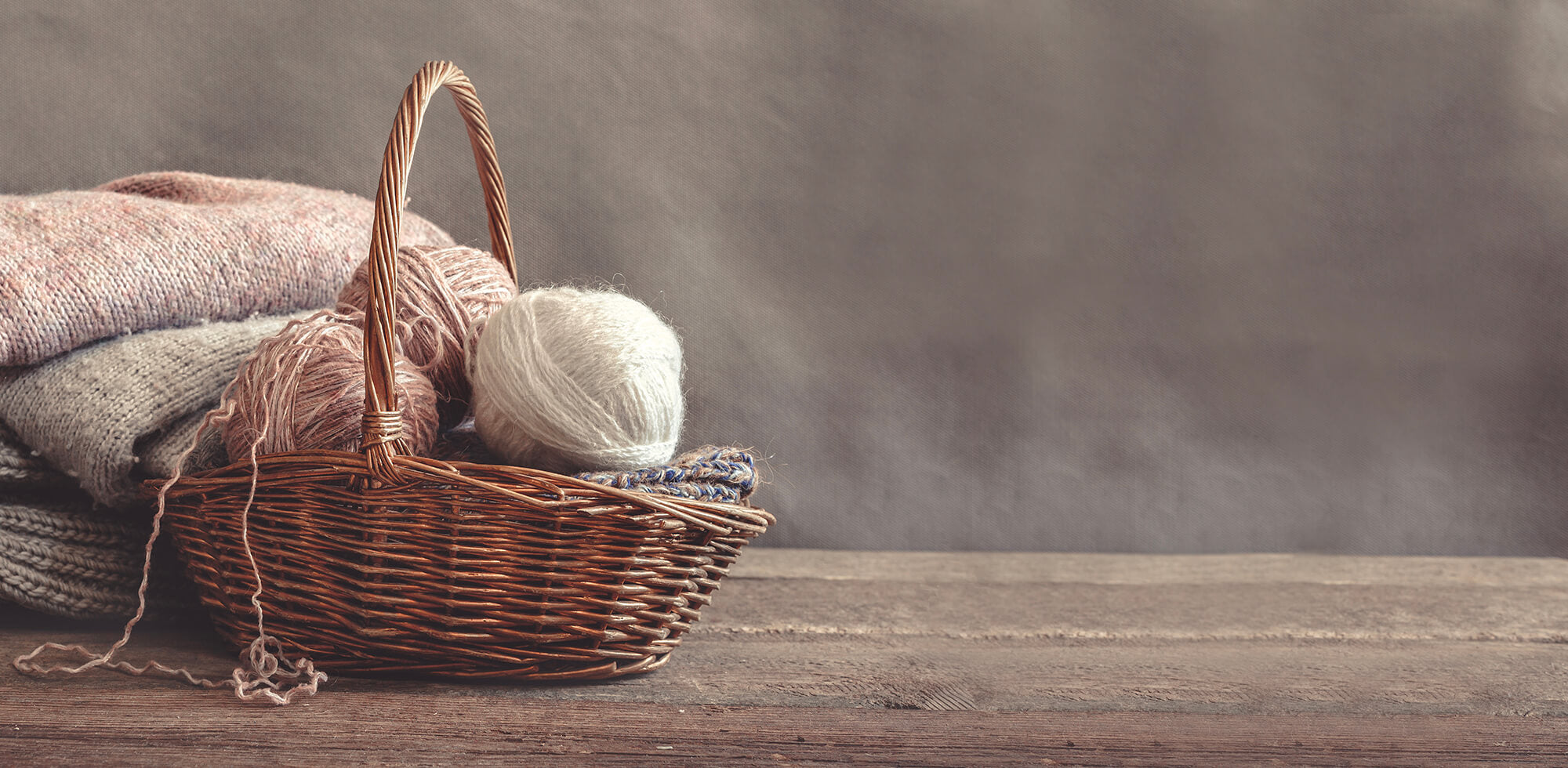By Pascuali
Knitting is relaxation
Whether after a long working day, sitting in a waiting room, traveling on a train or just because: Knitting relaxes. The repetitious movement of the needles and yarn has a calming effect. As a result, less of the stress hormone cortisol is released, which in turn causes the blood pressure to lower and the pulse to slow down.
Your thoughts can wander because the motion of your hands is controlled solely by muscle memory. You can switch off mentally, and forget about the stresses of everyday life. As a knitter, you know full well - knitting is not for those in a hurry. It takes time for a large project to be completed. Accepting this is accepting that knitting really helps us to slow down and unwind.
According to a study by Dr. Herbert Benson of Harvard Medical School, knitting can be as relaxing as yoga or meditation, because of the even, repetitive movement of the fingers and the focus on manual work. If the pattern you are knitting is not too complicated, you can get into a flow while knitting and get lost in the rhythm of the yarn and stitches.
Top tip: Always have a "mindless" knitting project on the needles!
Perfect for those moments when you need to switch off mentally for a while.
Knitting is good for your memory and ability to focus
Not only does knitting compete with the meditative effects of a yoga class, it can also stimulate the brain!
When knitting, you have to count stitches, memorize repetitive patterns, and sometimes re-calculate and adjust stitches: These are all good brain exercises!

According to a study published in 2011 by researcher Dr. Yonas Geda from the Mayo Clinic in Rochester, people who craft have fewer problems with their memory. The risk of pathological memory loss (i.e., pre-Alzheimer's disease) was 40 percent lower amongst the 1,300 older people that took part in the study, when they undertook manual activities such as knitting. Brain researchers believe that knitting can promote the agility of the nerve tracts in the brain, which then grow and connect, helping to maintain cognitive health. The simultaneous and rhythmic movement of both hands also makes it easier for the right and left hemispheres of the brain to connect compared with other activities where one side of the brain is used more than the other. The neuron connections that run between the individual areas of the brain become more flexible the more they are used.
Knitting is perfect for concentration and can help to prevent memory problems in later years.
Knitting is also extremely beneficial for child development. Educational scientist Iris Kolhoff-Kahl recommends that manual work should be given a higher priority in education once again, as repetitive processes, such as knitting, are important to stimulate the networks of the brain.
Knitting improves motor functions
When knitting, the hands are constantly moving, and depending on the pattern you are knitting, these movements can be simple or more complex. This is because it is easier to knit in stockinette or garter stitch than to knit cables with an additional cable needle, or Fair Isle knitting, working with several colors and strands all at once. Knitting stimulates almost the entire brain all at the same time. The brain is made up of the frontal lobe (which controls processing, attention and planning), the parietal lobe (which processes sensory information and spatial awareness), the occipital lobe (which processes visual information), the temporal lobe (which is involved in storing memories and interpreting language and meaning) and the cerebellum (which coordinates the precision and timing of movement).
In therapy, knitting can be used to help people with diseases such as Parkinson's improve their motor skills, as it can help improve fine motor skills and also distract from painful symptoms. More about this below.
Knitting can help ease anxiety, stress and depression
The relaxing effects of knitting can go beyond the stresses of everyday life. It can help to alleviate anxiety and even depression, as it stimulates the parasympathetic nervous system. This is the part of the brain responsible for rest, digestion and relaxation. It is also known as the "resting nerve" or "recovery nerve". The New Zealand magazine "Listener" reports on a survey in which 73 percent of the 3,500 people surveyed said they felt significantly less stressed when they picked up their knitting needles at least three times a week.
Working with handicrafts such as knitting can also help to calm and still the mind, as the concentration required is a distraction. The nervous system is no longer in "fight or flight" mode and the emotions are calmed. To be completely absorbed in a restful task helps to reduce inner restlessness, depression and fear.

Knitting for or against arthrosis/arthritis and tendinitis?
If you don't use your brain, it will eventually rust. The same applies to the joints, which need to keep moving to stay healthy and flexible. According to Dr. Alton Barron, orthopedist and president of the New York Society of Hand Surgery, knitting can prevent osteoarthritis and tendinitis. The gentle use of the fingers builds up the cartilage and makes it stronger instead of wearing it out. If you are already suffering from osteoarthritis or inflammatory arthritis, he recommends soaking your hands in warm water before knitting and knitting with needles that are not too thin. Patients feel that choosing the right needles for joint problems is very important. It can be helpful, for example, to use light-weight bamboo or wooden needles or circular needles, where the weight of the knitted item rests on your lap rather than on the wrists as with straight needles. With joint problems it is important to listen to your body and take regular breaks to avoid your hands complaining too much.
Also, knitting is good physiotherapy after wrist or arm fractures, because the constant small movements are good for muscles and tendons.
Knitting as pain therapy
Mentally shutting down and forgetting the outside world while knitting is also good for pain therapy, as the endorphins that are released during knitting help to reduce the sensation of pain. Physiotherapist Betsan Corkhill conducted a study with 60 patients suffering from chronic pain. While knitting, they were distracted and no longer focused on the pain. This reduced perception of pain signals continues after knitting, thus helping with pain management for chronic pain patients.
Knitting restrains!
Although it is unlikely that knitting would be used for addiction therapy, it is true to say that if you have your knitting in your hands and your fingers are busy, you will be less likely to reach for chocolate, crisps, cigarettes, your phone, or a glass of wine. Knitting and alcohol don't really mix anyway, as the alcohol can affect your fine motor skills and concentration. This is not recommended if you are knitting a complicated pattern or have to keep an eye on your stitch count! Speaking of chocolate – did you know that knitting burns 55 calories in half an hour?!
Last but not least: Knitting is simply great!
After so much scientific consideration of knitting and its positive effects, we don't want to forget one thing - knitting makes us happy, and there are so many reasons for that.
You can choose exactly what you want to knit. A cardigan or a sweater, a scarf or a cap even socks. The shape, color and size are all up to you!
Stockinette stitch or cabled? Lace pattern or fisherman's rib? Solid or Multicolored?
What kind of yarn? A simple cotton yarn, soft merino wool, a slightly more robust lambswool, or maybe something more luxurious such as camel wool, yak wool or cashmere yarn?

Do you value sustainability? As a knitter you are in control, because unlike ready-made garments you can always choose a hand knitting yarn that is good for the environment and animal welfare. When choosing yarn, you can decide whether it should be mulesing-free or superwash. Do you attach importance to fairness? No problem, a glance at the label will tell you whether a yarn is GOTS-certified, for example, and therefore particularly friendly to the environment, people and animals.
You probably appreciate a hand knitted garment much more than a ready to wear one bought in a shop. It gives you a lot of pleasure and you wear it for a long time, which is much better for the environment in this throwaway world of ours!
Your creativity is addressed, because even if you follow a pattern exactly as it is written, you will always be thinking about yarn and colors. And the longer you knit, the more likely you are to adapt patterns to your personal taste.
Are you a hunter/gatherer? Then knitting is the perfect hobby for you! How wonderful it is to get lost in all the gorgeous yarns on offer these days and bring home one or two beauties. Surely you will need them one day for a project...
Knitting makes you proud. That might sound a bit strange, but why shouldn't we be proud of something we created with our own two hands? After all, not everyone can knit - so we should be proud of our achievements!
Although you can knit anywhere and everywhere, including at home on your own, like any other hobby, knitting encourages social contact. A shared hobby connects you to others and is always a subject for discussion. You may be lucky enough to have knitting groups or knit nights nearby, but the internet also offers many possibilities to exchange ideas with like-minded people through platforms such as Ravelry. Many virtual friendships have turned into real ones.
An enjoyable hobby makes you happy. Knitting makes you happy! And now on to the needles!




